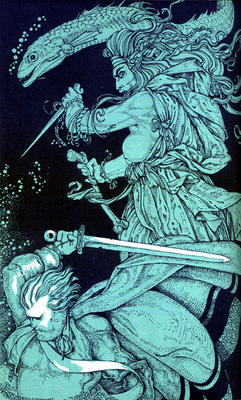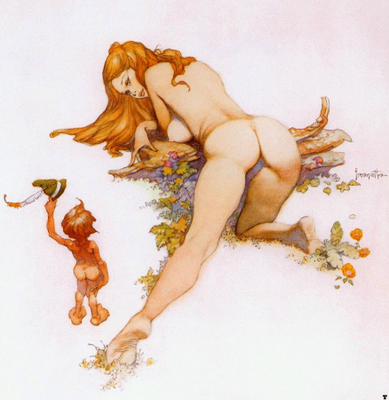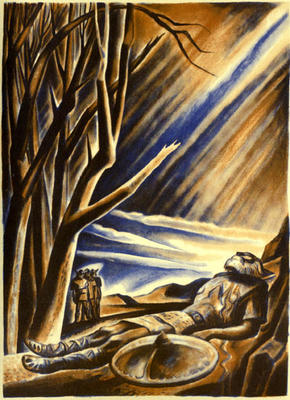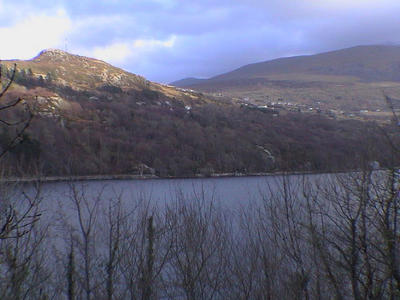If You Meet The Hero on the Road (Myth Beyond the Monomyth)

... the stone that moans when stricken. Wind broke it. Wave bore it. Reed wrote of it. Syce can with it. Hand tore it and wild went war. Hen trieved it and plight pledged peace. It was folded with cunning, sealed with crime, uptied by a harlot, indone by a child. It was life but was it fair? It was free but was it art? The old hunks on the hill read it to perfection.
-James Joyce, Finnegans Wake
Is our cultural future doomed to life inside the monomyth? I believe the hero is stuck in his myth, that no matter how much he spiritualizes his task he is quintessentially bound to his mother, and will seek return to Her, whether it be in the form of the sexual exploits (treasure -- booty stolen from the dragon's lair), or the wife he eventually marries, or the nourishing culture he returns to; even his work is bound to her, creating in mimesis of Her.
Joseph Campbell got the term "monomyth" from Joyce -- his book A Skeleton Key to Finnegans Wake immediately preceded the writing of Hero of A Thousand Faces. Joyce was THE high modernist, the artist as god; and Joyce was a jealous god, suffering no lesser author in his authoritative company. His books were THE books, definitive in a way that has some critics believing that we are hundreds of years from fully grasping Joyce.
Campbell seems to have been one of those devotees, and his resuscitation of the monomyth was like raising Finnegan from the bad dream of History, attempting through his studies in comparative mythology to read the hieroglyphs scrawled on the walls of Joyce's labyrinth, his great book of the dead.
But did Campbell get stuck there? I wonder. Here is my main point: How do we get beyond the hero and his ego-consciousness? Much of our malaise seems to be his extreme efforts to wrest control from Mother Nature, and the damage of that attempt ranges from materialism to spouse abuse to global warming and the absolute pillage of the seas. We die of him daily and by global degrees. His final victory cry may be our dirge.
It seems that the big issue for many cultures these days is the struggle between modernity and conservatism. We are confronted with a world beyond traditional notions of God and humanity, and the road ahead seems fraught with peril. Christian and Islamic fundamentalists both seek to return us to the good old days of certainty and authority, yet their heated, organized and armed resistance represents one of the greatest threats to our day. Our science presents us with a world beyond intelligent design, yet we would have intelligent design taught as science.
We cling to the outdated monotheist ideas, and the monomyth cloys in the same way. God was declared dead more than a century ago, and Finnegans Wake is going on 60 years old, but God hasn't given up the ghost in the raw psyche of modernity. The hero -- here pope, mullah, Baptist preacher, FOX News -- battles to be free of the new womb, using all the weapons formed by sorcerers of technology; and yet he unconsciously clings to her with an even greater tenacity. He's stuck, and so are we.
Beyond high modernism -- that religion of art -- there comes the white noise of post-modernism, random, a polyphonous "parallel, not serial" (from Pynchon's Crying of Lot 49) chorus, opening a maw of perception which demands a dissolution of the center, a release of the ego's grip, a driving-down of consciousness into its parts, into organ consciousness, polytheism, a pandemonium of images. We grow into the dream, but can we let go of our waking state?
Defenders of Campbell's monomyth might ask themselves where the conservatism of his thought is in this forum -- his teachings seem to be clear on that, but we endlessly dissent, or speak from wildly different chakras of thought. The multiversal discourse of the Internet perhaps represents the plurality beyond the hero. Ah, but its not a satisfying drone, is it? Wouldn't it be great if we all agreed with each other? If there was harmony, unity, the grace of singularity? Must we let go those values in the name of what follows?
Now don't get me wrong -- Jung, Joyce and Campbell are my heroes (yikes) -- but I wonder if my veneration of them keeps me, as well, stuck in their monomyth. If I would be free, must I somehow go beyond the bounds of their maps, out past where there is only chaos and madness?

Tuff territory, but we aren't without good suggestions on how to proceed. The first one I offer today.
In James Hillman's essay, "The Great Mother's Son, Her Hero, And the Puer," he suggest that there is no "getting rid" of hero and his complex in our psyche, since such actions are in themselves heroic:
"Getting rid of and giving up this complexity through any formula for overcoming opposites, or dropping out, or curing misses psychic reality. Psychological therapy is less an overcoming and a getting rid than it is a decay, a decomposing of the way in which we are composed. This the alchemists called the putrefactio, the slow time-process of transformation through affliction, wastage, and moral horror. Both heroic getting-rid and passive giving-up attempt to speed decay and have done with it; they would avoid the work of psychic reality by escape into spiritual salvation. But the cure is the decay.
"When the puer [the hero unconsciously attached to his mother] lives authentically to its structure, there is this smell of decadence, a fond attachment to one's mess, which is part of its resistance to analysis. In this sense the puer -- seemingly so quick and flame-like -- is slow to change, shows no development, seems forever stuck in the same old dirty habits. His putrefaction is in his intractable symptoms of colon and digestion, of eczema and acne, of piles, in his long, slow colds and sinuses, his chronic genital complaints, his money peculiarities, or his low-life fascinations."
Important point here:
"These things analysis has wrongly attributed to the shadow repression owing to the mother-complex: he is bound to the mother in a compensatory materialistic way and cannot fight free. But against the background of decay, the slowness and the dirt in the puer can be seen as a way of following the path of putrefaction toward finding the senex. As such it is a digestive, fermentative process that should not be heroically hurried. Nor should it be forcefully 'rubbed in' as a treatment to integrate the shadow. The puer is not a dog; puer consciousness needs not housebreaking and heeling [hey, there's the wounding of the heel again!!] but a new attunement his sensitivity to the odors of his own decay. His individuation is in the pathologizing process itself and not in his heroic efforts to overcome. (The essay is anthologized in Spring Publications' Fathers and Mothers
We don't defeat the hero as much as let him waste away in his archetype. Finnegan continues to rot in the mythic res of our culture, and the monomyth slowly disintegrates with him. I was told once in psychotherapy that "every access is a reframe," meaning that every time I revisited the scenes of my formative horror that my view of them -- and my sanity -- would change. We may not be able fight free of the hero's keep in our centers, but we can harrow it, swim with Beowulf down into the mere, defeat Grendel's mam, swim with him back to shore, reap his praises & drink champion's portion, grow old with him, die with him when he faces off with his last dragon. There is an aging in every hero tale, youthful cordage of muscle loosened into fat, gold hair gone grey, teeth which bit through the she-beast's coils rotted, falling out one by one. And we aren't a hero as much any more, and seem to think more about teaching the young, ruling the land: the warrior becomes husbandsman, sword bent into plow, killing spleen become the blade which furrows the ground, planting back the seeds of our once-boiling loins.
Hero With A Thousand Faces is more than 60 years old too, so much of its force of argument has decayed. Talk of the monomyth seems to have died down a lot. Archetypal psychology as presented by Hillman et al has replaced the singular motif of the hero's battle with the mother with polytheism of complexes and styles of identity and growth. Joyce's influence has waned, as has Pynchon the high post-modernist has waned greatly since Gravity's Rainbow. Rot and waste are is the constant entropy of cultural disorder, high things watering down, the best fragmenting into the good and then the merely rehashed, Hellenic gone Hellenistic, high art become rehashed Hollywood trash. Hillman suggests in the evolution of the hero that such decay may not be all that lamentable, because it's the only way we get past Finnegan, allow old bones to lie, let the hero die of his wounds, and get on with our work, whatever that may be.

In Wick-Lit I've been resuscitating old sources, going back over things I've studied and written in the past 15 years. I'm doing this because the poetry HAS died, or silenced; that daily discipline of about 5 years running simply droned down into silence. My themes had become too cloistered, redundant; my tropes cliched; my rhythms and rhymes stereotypical. Wounded in a dozen ways, the heroic effort ceased. What next? A littel extramarital schnickschnacking in the rhetoric of prose? Do I go back home to poetry after hurling these oats? Can I? For now, this wasteland of gorgeous wounds. I seem to go into these void-of-courses every mid to late August. Resting, regrouping, letting a dark moon cycle on through. Well, the moon is nearly full, so there is an anticipation here, a sense I will soon begin.
But more of this yet to follow ...
THE HEATHEN GIANT
(In episode 4 of The Voyage of St. Brendan) Brendan, having had a ship built for him, finds the exceptionally large head of a dead man on the beach. Its forehead measures five feet across. When Brendan asks what kind of life he has led, the man's head answers that he was a hundred feet tall and very strong. He was a heathen who waded through the sea to rob ships. This he did for a living. In a heavy storm which whipped up the waves to extreme heights he was drowned. Brendan offers to pray for the giant, and to beg God to revive him so that he may be baptized. Once that is done, the giant may even, if he lives to praise God, find forgiveness for his sins, and eventually ascend to paradise. The giant refuses; his is afraid that in his new life he might not be able to withstand the temptation of sin. What if he started robbing again? He would be a lot worse off then as, according to the giant, Christians are punished much more severely in hell than pagans. Moreover, the prospect of having to suffer the pain of death as second time frightens him. He wants to go back to his torments / poor companions in the place of darkness. He departs with Brendan's best wishes. Brendan then proceeds on his way.
-- Clara Strijbosch, The Seafaring Saint
The old nights lay like massive bones
scattered on the beach, the skull
like a split moon buried in the sand.
Sea-sounds through its occiput
are the voices of memory, faint
and ghastly as the depths I once
fell to find you in the darkest
beds of sweet abyss. He remembers
the feral heart of old, icy and
on fire for plunder, parting thighs
with blue gusto & launching his
dragon ship there with the pith
and pitch of awfulness,
rowing voices crowing one pent
dragon seethe. Eye-sockets big
as church-doors retain the marrow
of those nights, their dark abcessa
still lucent, even lewd, harrows which
invite the next arriving saint to
find a heaven wide enough to
revive and save a soul so massive,
old and hungry. But he will not
rise again, not for all the pearly
virginettes bent in heaven's
puffy marge. Wholly dark now, he
strides between this beach and
those dark nights, sporting
in a sea of finned and ghostly
salt delights, unrepentant
as my backwards glance which
call his life and ways both holy.
I appoint that house of bleached
ribs apt chapel of the wilder
half of my heart and God's and
yours, you who would embrace
the seven seas to slake
your womb's blue belling need.
Gaping Gill, swift to mate errthors, stern to checkself, (diagnosing through estacetube that it was to make with a markedly postpuberal hypertitituary type of Heidelberg mannleich cavern ethics), lufted his sloping forward, bad Sweatagore, good murrough and dublinoch on to it as he was greedily obliged, and like a sensible ham, with infinite tact in the delicate situation seen the touchy nature of its perilous theme, thanked um for guilders received and time of day (not a little taken abock all the same that that was owl the God's clock it was) and, upon humble duty to greet his Tyskminister and he shall guildthegap Gaper and thee his mouldy voids, went about his buisness, whoever it was, saluting corpses, as a matter of corse (one could hound him out had one hart for the monticles of scalp and dandruff droppings blaze his trail), accompanied by his trusty snorler and his permanent reflection, verigracious; I have met with you; bird, too late, or if not, too worm and early; and with tag for ildiot repeated in his second-mouth language as many afor the bigtimers verbaten words which he could balbly call to memory that same kveldeve, ere the hour of the twattering of bards in the twitterlitter between Druidia and the Deepsleep Sea ...
-- dreamin' HCE in Joyce's Finnegans Wake, 32-3


<< Home